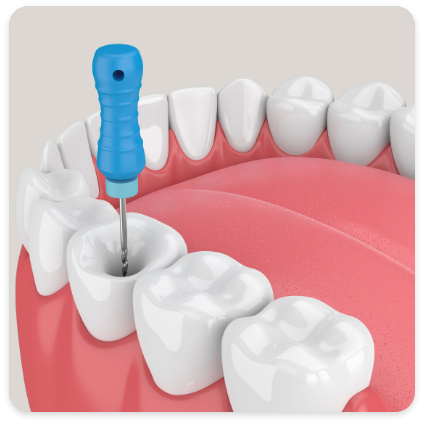What is root canal treatment?
Root canal therapy helps relieve pain caused by infected or abscessed teeth by extracting the decayed dental pulp to save the natural tooth and safeguard nearby teeth.
When is root canal treatment necessary?
Root canal therapy may be necessary if a bacterial infection has severely damaged the dental pulp. Left untreated, this infection has the potential to spread and affect other teeth as well.
Here are some signs that you may need root canal therapy:
- Experience pain when chewing or biting down on food
- Sensitivity to cold or hot drinks
- Pus coming out of the tooth
- Swollen gums
- Swollen cheeks
- Tooth discoloration
- Loose tooth
- Chipped or cracked tooth
- An infected pulp cannot heal on its own. Therefore, if you experience severe toothache that won’t go away, make an appointment with your dentist for a thorough exam and diagnosis.
What happens during a root canal procedure?
At the center of every tooth is the dental pulp, which extends from the crown to the tip of its roots. This contains blood vessels, nerves, and tissue. Cavities or decay can allow bacteria to enter this pulp and cause inflammation.
Root canal therapy typically requires two dental appointments to complete.
Here are the general steps involved:
- First, images of your teeth and mouth are taken to assess any damage.
- Your dentist applies local anesthetic for comfort during the procedure.
- A dental dam is placed inside your mouth to prevent saliva from entering during treatment.
- On a tooth with decay, an opening is made through the crown to access its dental pulp.
- Infected pulp is taken out and cleaned from within the root canal before drying and sealing off with a temporary filling.
- Finally, a temporary crown may be placed to further protect and seal off the tooth.
If you received a temporary filling, it will be removed to make way for your permanent dental filling. Your dentist may suggest getting a crown to strengthen the affected tooth; however, be sure not to bite or apply pressure until after healing has taken place.
Depending on the severity of the damage, you may require antibiotics to contain the infection and prevent it from spreading.
Can I Return to Daily Activities After Root Canal Therapy?
Most patients can resume their daily activities the day after having a root canal procedure. If you’ve received sedation, however, wait until the numbness subsides so you can eat again.
Are you in Little Italy, Toronto, ON and considering root canal therapy?
Although these procedures may seem intimidating at first glance, they can be completed quickly and with the utmost comfort for all parties involved.
At Little Italy Dentistry, we prioritize listening to and understanding your individual needs during your initial consultation in order to make your experience as stress-free as possible.
Root canal therapy shouldn’t be painful, but everyone’s tolerance for discomfort varies. We make the process easier so you can resume your daily activities right away.
Reach out to us now to book an initial consultation with the dentist in Little Italy, Toronto, ON.







